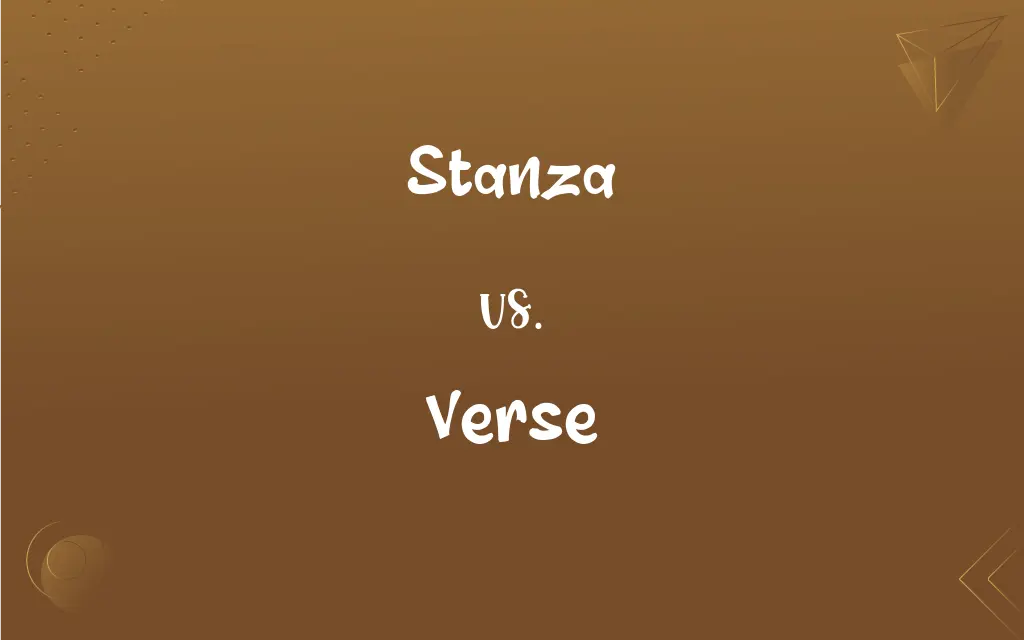Stanza vs. Verse: What's the Difference?
Edited by Aimie Carlson || By Harlon Moss || Updated on October 9, 2023
Stanza refers to a grouped set of lines within a poem, whereas verse can refer to any single line of poetry or an entire poem itself.

Key Differences
A stanza, a foundational element in poetry, is a grouped set of lines, often set apart by a space, crafting a visual and rhythmic unit. In contrast, a verse serves a broader function, denoting either a single line of a poem or a piece of poetry in its entirety, thus encapsulating varying structures and lengths. The use of stanzas brings a rhythmic regularity and structural neatness, while verses offer flexibility in defining the scope of poetic expression.
Often, a stanza adheres to a specific rhyme scheme, curating a defined pattern within a segment of the poem. Verses, alternatively, maneuver through the entirety of a poetic work, unrestricted by a singular rhyming pattern or structured format, allowing an expansive canvas for a poet's expression. The adherence of a stanza to a rhyme scheme shapes the auditory experience of the poetry, while the verse maintains a freer reign, guiding the overall poetic narrative.
as singular lines, they forge rhythmic and metric contributions, and as entire poems, they establish thematic unity and the holistic essence of the work. While stanzas act like chapters within a verse, segregating and grouping lines, the verse itself can stand as an individual entity or serve as the collective body of lines.
In the realm of songwriting, a stanza often takes a backstage, replaced by more commonly used terms like chorus and verse. In this context, a verse, unlike in poetry, indicates a particular section of a song, typically leading to the chorus. This difference highlights a contextual versatility where the word "verse" morphs its role in songwriting, marking a distinctive segment, while the stanza, despite its less frequent use in this medium, still maintains its association with a grouped set of lines.
Comparison Chart
Basic Definition
A grouped set of lines in a poem.
A single line of poetry or an entire poem.
ADVERTISEMENT
Function
To create rhythmic and thematic units.
To express a poetic idea or the whole poem.
Structure
Typically adheres to a rhyme scheme.
May or may not adhere to a rhyme scheme.
Usage in Songwriting
Rarely used, maintains traditional meaning.
Commonly used, indicates a song section.
Flexibility
Structurally consistent and compartmental.
Can be structurally varied and expansive.
Stanza and Verse Definitions
Stanza
A stanza represents a distinct, grouped set of lines within a poem, often separated by a space.
Each stanza in the poem seemed to unveil a new emotional layer, deepening the overall impact.
ADVERTISEMENT
Verse
A verse denotes a single line of poetry, usually showcasing a rhythmic and metric structure.
The melancholy of the verse touched every listener's heart with its somber melody.
Stanza
Stanzas typically adhere to a consistent rhyme scheme, providing a rhythmic structure to the poetry.
The ABAB rhyme scheme of the stanza enriched the poem with a melodic and structured rhythm.
Verse
Verse can also refer to an entire poem, encapsulating both its thematic and rhythmic essence.
Emily Dickinson's verse often explores themes of death and immortality, weaving them through her succinct style.
Stanza
The stanza serves as a visual tool, compartmentalizing the poem into readable, coherent sections.
As I read, the well-crafted stanzas offered a visual pause, guiding me through the poet's journey.
Verse
In songwriting, a verse typically pertains to a section of the song that precedes the chorus.
The melody of the verse subtly introduced the themes that would later explode in the chorus.
Stanza
A stanza can function as a thematic unit, housing specific ideas or emotions in its lines.
The second stanza shifted in tone, introducing a contrasting emotion that enriched the narrative.
Verse
Verse in literature might refer to a section of a religious or historical text.
He quoted a verse from the Bible, invoking a sense of unity and shared belief among the congregation.
Stanza
Stanzas, especially in classical poetry, often adhere to specific metric and structural forms.
The sonnet's final stanza resolved the thematic tension, adhering to its traditional structure.
Verse
Blank verse refers to unrhymed iambic pentameter, maintaining rhythmic quality without rhyme.
Much of Shakespeare's work is written in blank verse, offering rhythmic speech without confining rhymes.
Stanza
One of the divisions of a poem, composed of two or more lines usually characterized by a common pattern of meter, rhyme, and number of lines.
Verse
A single metrical line in a poetic composition; one line of poetry.
Stanza
A unit of a poem, written or printed as a paragraph; equivalent to a verse.
Verse
A division of a metrical composition, such as a stanza of a poem or hymn.
Stanza
(architecture) An apartment or division in a building.
FAQs
Does a verse always rhyme?
No, a verse does not have to rhyme and can be written in free verse or blank verse, among other styles.
Can a poem exist without stanzas?
Yes, poems can exist without distinct stanzas and may be written as a single, continuous entity.
How does a stanza enhance a poem’s readability?
Stanzas break poems into readable sections, often providing thematic or emotional compartmentalization.
Are verses always short?
No, verses can vary in length, with some being quite lengthy, depending on the poet's intent and style.
What is the purpose of breaking poems into stanzas?
Breaking poems into stanzas can create rhythmic, thematic, and visual structure, enhancing the reader’s experience.
How does a stanza differ from a paragraph in prose?
While both divide text, stanzas have rhythmic and thematic structures often absent in prose paragraphs.
What is a stanza?
A stanza is a set of lines in a poem, grouped together and often following a rhyme scheme.
Is a verse the same as a stanza?
No, a verse refers to a single line of poetry or an entire poem, while a stanza is a grouped set of lines within a poem.
Can a verse refer to text outside of poetry and songs?
Yes, "verse" can refer to sections of text in religious or historical documents.
Is a stanza necessary for creating rhythm in a poem?
While stanzas can enhance rhythm, rhythm can also be created through meter and word choice independent of stanza structure.
Can a poem be a single verse?
Yes, a poem can be just one verse (line) long, known as a monostich.
How does a stanza contribute to a poem’s theme?
Stanzas can isolate ideas or emotions, aiding in the development and progression of a poem’s theme.
What is the smallest possible stanza?
A couplet, consisting of two lines, is the smallest possible stanza.
Can one stanza stand alone as a complete poem?
Yes, a single stanza can be a complete poem, especially in shorter poetic forms like haiku.
How many lines does a standard stanza have?
There's no standard size: stanzas can range from two lines (couplet) to eight (octave) or more.
Can a verse have its own title?
Generally, verses don’t have individual titles; however, creative liberties allow for variations in form and structure.
Can a stanza exist independently?
While a stanza can convey a specific idea or theme, it is typically part of a larger poem and does not exist independently.
Are all stanzas in a poem required to follow the same rhyme scheme?
No, stanzas within a single poem can have varied rhyme schemes, although consistency is common.
What is a verse in the context of songwriting?
In songwriting, a verse is a section of the song, often telling a story, leading into the chorus.
How does the function of a verse vary in poetry and music?
In poetry, a verse can mean a line or an entire poem; in music, it typically refers to a specific section of a song.
About Author
Written by
Harlon MossHarlon is a seasoned quality moderator and accomplished content writer for Difference Wiki. An alumnus of the prestigious University of California, he earned his degree in Computer Science. Leveraging his academic background, Harlon brings a meticulous and informed perspective to his work, ensuring content accuracy and excellence.
Edited by
Aimie CarlsonAimie Carlson, holding a master's degree in English literature, is a fervent English language enthusiast. She lends her writing talents to Difference Wiki, a prominent website that specializes in comparisons, offering readers insightful analyses that both captivate and inform.































































